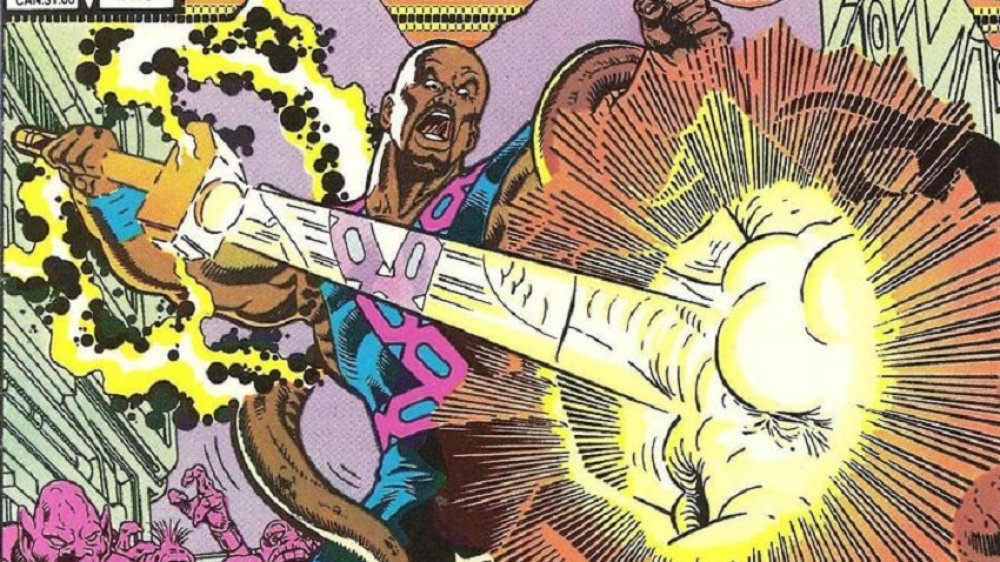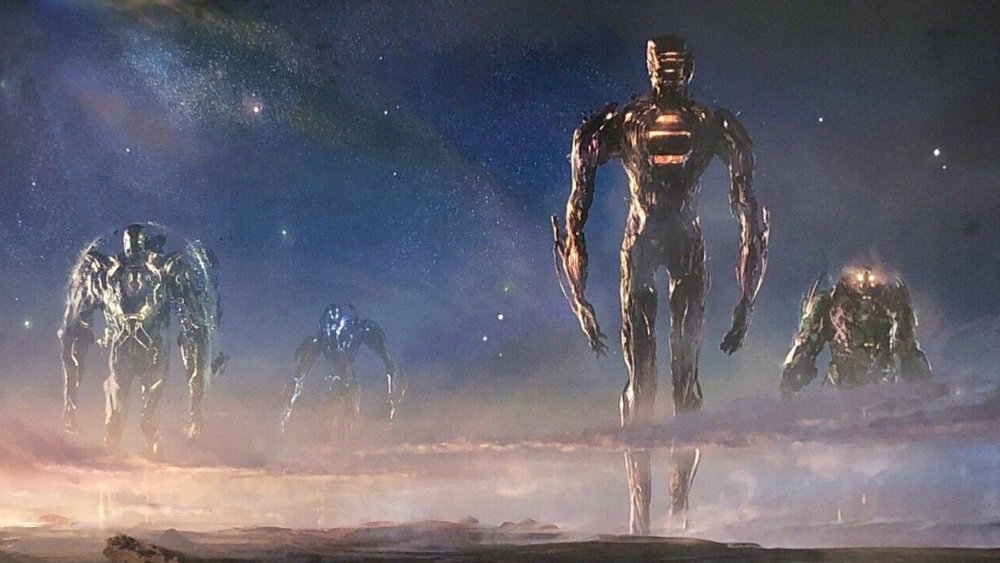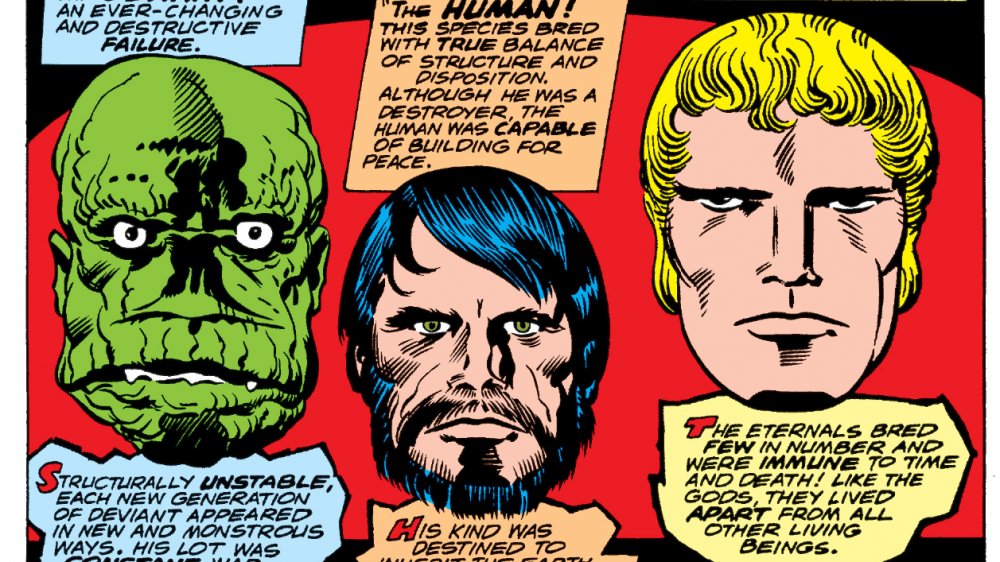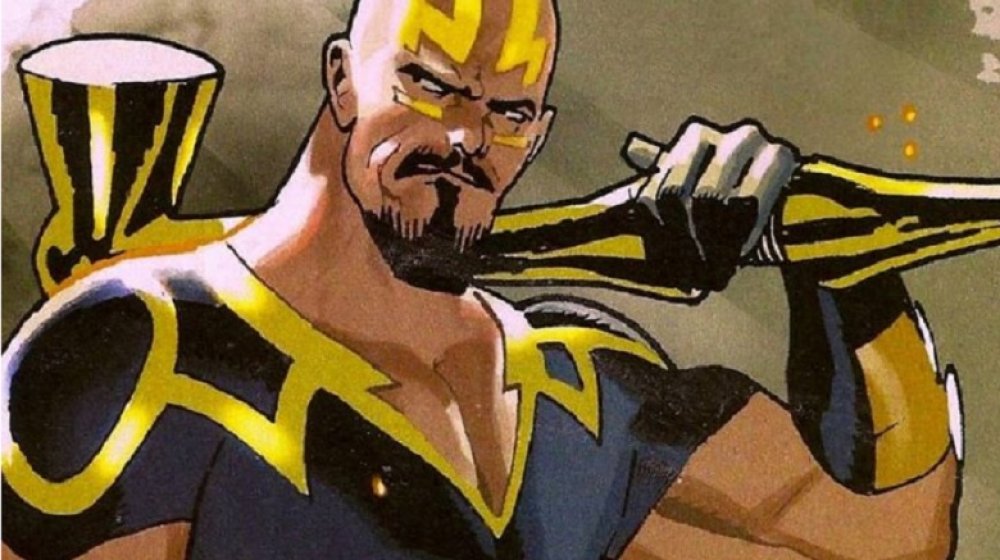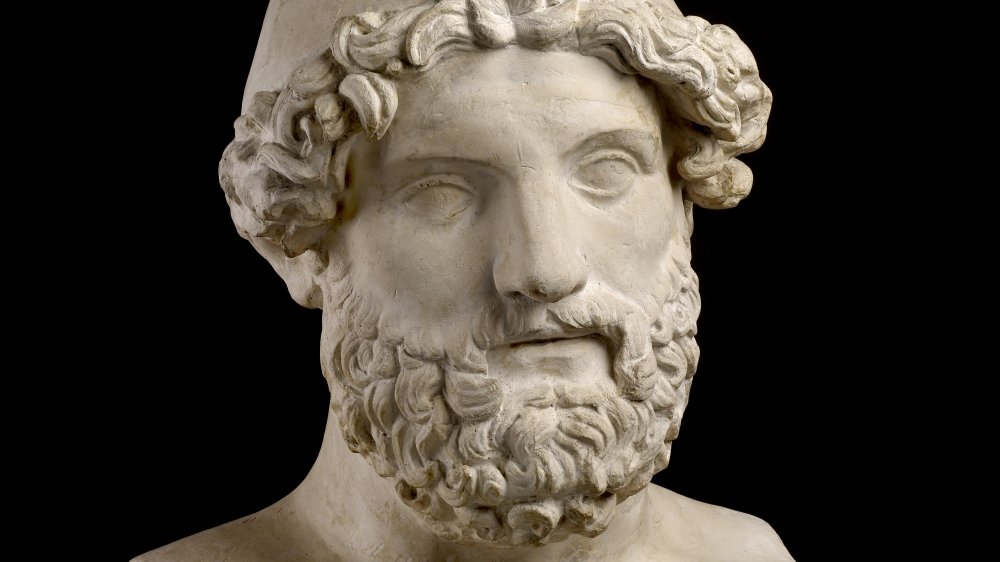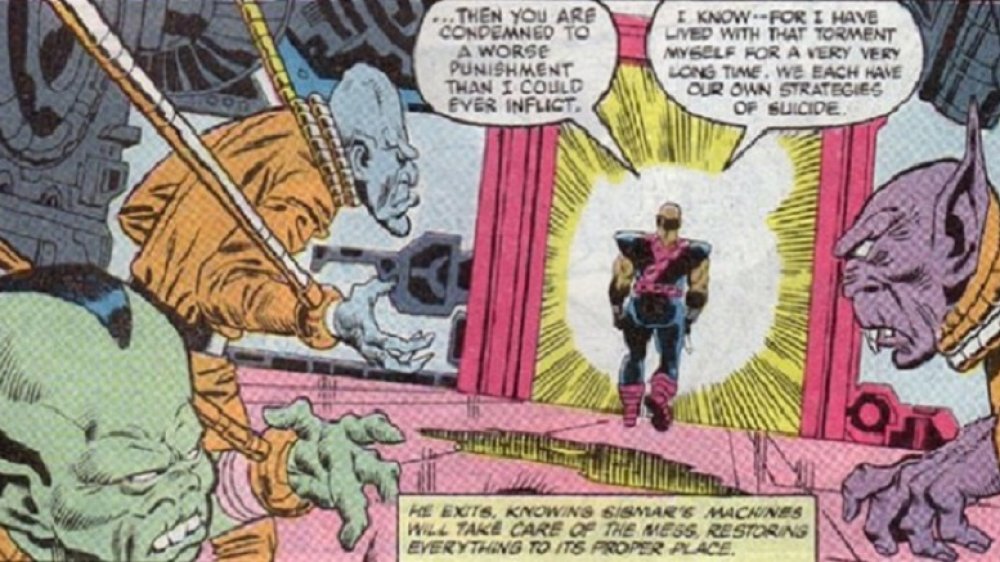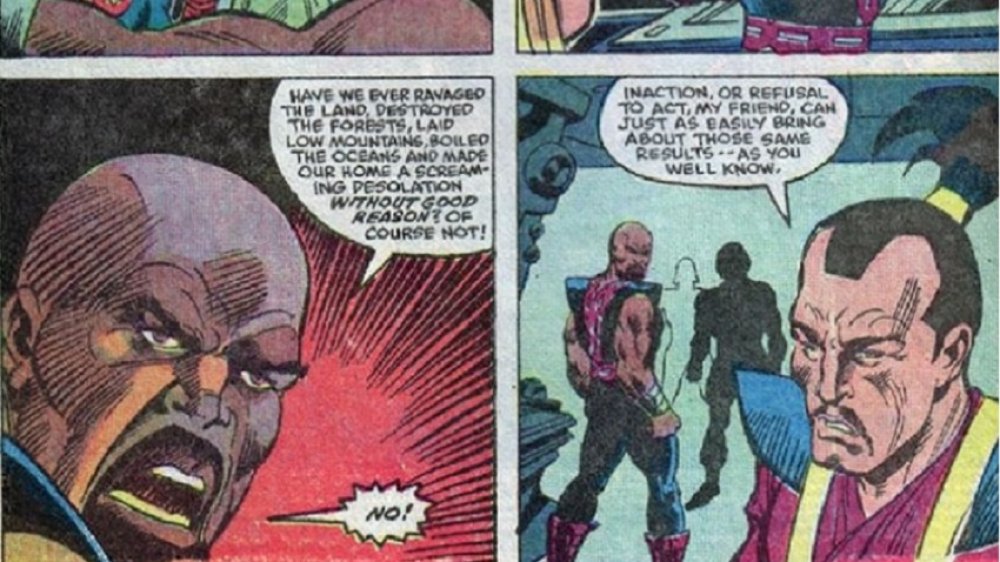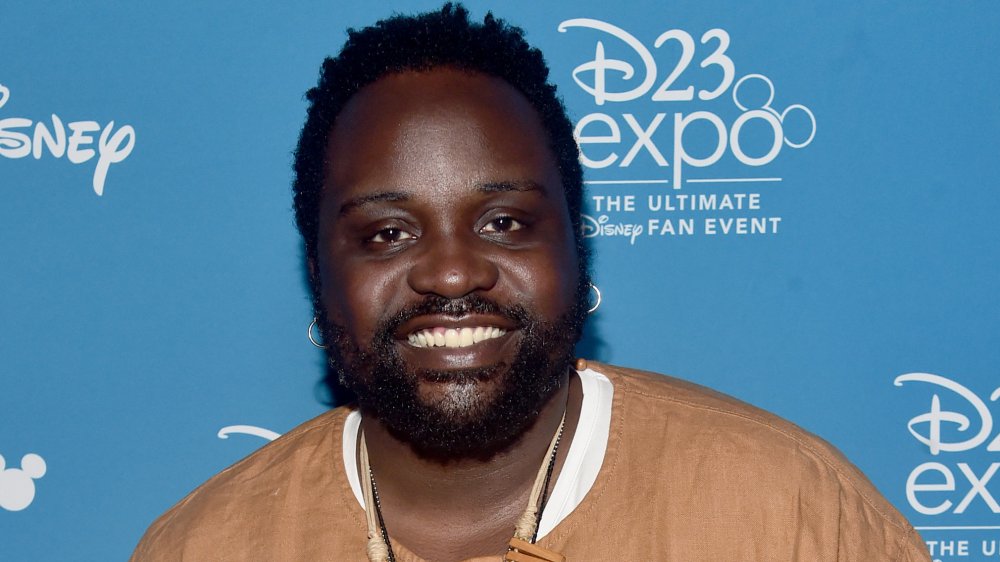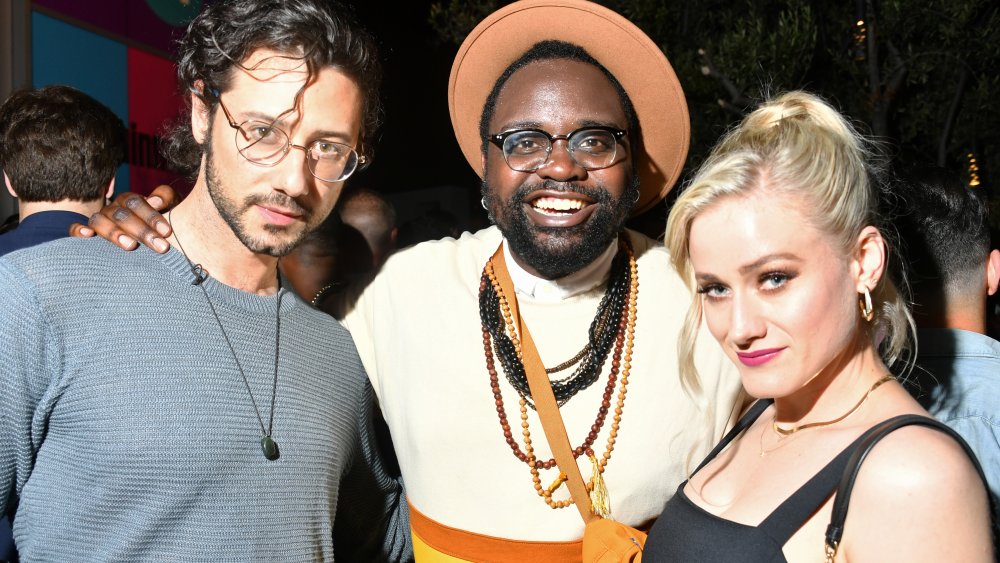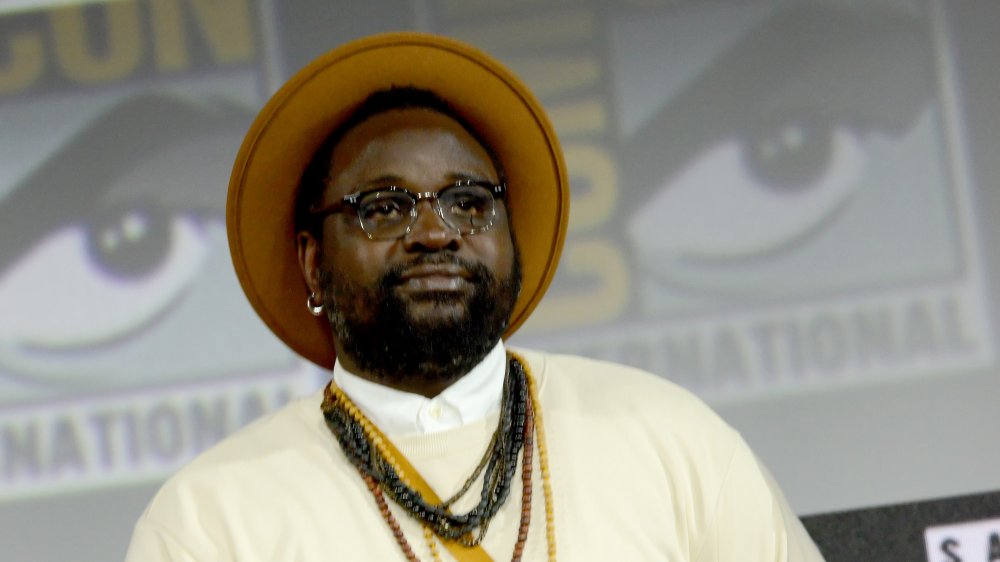The History Of Marvel's Phastos Explained
The MCU's seemingly unending reign over the box office has led to some seriously deep dives into the Marvel canon. Also-ran heroes and dusty fan favorites, long neglected in favor of marquee heroes like Iron Man and Captain America, are being hauled into the limelight: The next wave of Marvel movies will be stranger, more cosmic, and much more diverse, powered by older properties and niche heroes finally getting their chance to shine on the silver screen.
The Eternals are a prime example. Jack Kirby's cosmic saga follows immortal Earth-dwellers, created as an experiment by the universe's first sentient beings. It splashed onto the comic stands of the late '70s, carrying all the far-out philosophy and psychedelia one could want. And then it ended, and was relegated to second-tier status. Still, the MCU sees enough there there to make the Eternals a huge plank in their Phase Four raft of movies. Fans are pumped to familiarize themselves with a whole host of new names. Phastos, played by the magnetic Brian Tyree Henry, is one particular hero to know. Join us as we explore the past, present, and future of this Eternal artisan.
Who are the Celestials?
The Eternals were created by the Celestials, a group of ancient, ultra-powerful beings. The Celestials themselves were created by an entity that was, in the beginning, the entire universe in and of itself. This entity was known as the First Firmament. In time, the First Firmament grew lonely, and so it created a race of servants. These servants quickly divided themselves along two lines: There were the Aspirants, slavishly loyal to the First Firmament, and a group of rebels, who wanted to create some life of their own.
These heretical creations came to be known as the Celestials. They longed for a universe that could change, grow, and even die — a dynamic place, rather than a static one. The First Firmament branded them as madmen, and stoked divisions between the Aspirants and the Celestials. This led to a civil war, which raged for eons as the two groups created crueler and crueler weapons to wipe out their counterparts. The Celestials were very nearly vanquished, but infighting among the Aspirants gave them an opportunity for one last attack. They detonated bombs that tore apart the fabric of the universe, shattering the First Firmament and creating countless parallel universes. The Aspirants and what was left of the First Firmament fled into another universe. The Celestials were left to rule over their entire universe alone.
Who are the Eternals?
Eventually, the Celestials found Earth and its early human inhabitants. The Celestials tinkered with this new race of sentient life, creating two offshoot groups known as the Deviants and the Eternals. The Deviants are radically mutated beings with varied superpowers. The Eternals, in tremendous contrast, are gorgeous, nigh-immortal, and chock-full of impressive superpowers. Though they could physically fit in with humanity, unlike the Deviants, they ultimately decided to sequester themselves within fortress cities separate from humanity ... for the most part. Some Eternals still lived among humans, and many entered humanity's myths and legends as fabled figures like Gilgamesh and Circe.
On the other hand, the Deviants enslaved humanity, powered by their rapid rate of mutation. Both the haughtiness of the Eternals and the cruelty of the Deviants deeply displeased the Celestials. When they returned to prehistoric Earth, they nearly wiped out the planet with a great flood as punishment. The Deviants retreated to their flooded capital of Lemuria and the Eternals returned to their rigid separation.
A pacifist weapons-maker
Phastos was not an original member of Jack Kirby's short-lived Eternals series — the immortal blacksmith debuted in the first issue of the rebooted Eternals comic of the 1980s. He is a uniquely reticent Eternal, and defined by a unique contradiction: Though he is the primary creator of nearly all of the Eternals' technology and weaponry, he doesn't believe in war, and is deeply troubled by the uses to which his creations are put.
You might think that his convictions spring from a deeply-rooted belief in all life being sacred. In fact, Phastos believes almost the exact opposite. He's the existentialist Eternal, believing the universe to be an absurd place without meaning. He would like to be proven wrong, but nothing has managed to do that in thousands upon thousands of years. His melancholy has become infamous for its depth and durability, which stands in serious contrast to many of his more high-spirited kin. But while those like Sersi and Gilgamesh take pleasure in their lives, Phastos broods in the dark, longing for meaning in his endless life.
Greek myths
The parallels between Phastos and the Greek god Hephaestus run deep. The latter, a deformed and ill-treated son of Olympus, was the weapons-making god, patron of the forge, and inspiration to ancient blacksmiths and metalworkers. His status as one of the few gods who was physically imperfect saw him treated coldly by his divine brethren — but this cruelty also spurred him into creating brilliant inventions that compensated for his disabilities. Hephaestus was brilliant, exiled, strange, and forever apart from the Olympian pantheon, despite his unimpeachable claim to godhood.
Phastos, like Hephaestus, stands apart from his brothers and sisters in immortality. He is tremendously and uniquely skilled, and yet he is unable to fully enjoy the fruits of his labor or his own immortality. In the world of the Eternals, the ancient Greeks encountered Phastos from time to time. His super strength and incredible skills led them to believe that they were dealing with the actual Hephaestus. Like Sersi, immortalized by Homer as the island-dwelling witch of the Odysssey, Phastos inspired humanity's legends for centuries.
Brooding from the beginning
Phastos isn't the most well-known character in the Marvel cosmos. Writers have occasionally used him as a plot point, or as an interesting counterbalance to the warlike ways of most Eternals. Generally speaking, however, he has not been given a lot of breathing room in the pages of the Eternals' various stories.
We do get a fair bit of explanation about who Phastos is and what he believes in his first speaking appearance, however. Back in 1985's Eternals run, the majority of the Eternals leave Earth for an adventure in space. Phastos comes across a whole crew of Deviants wrecking an Eternal lab. He lays out his philosophy on fighting while chasing the wreckers off. "My hands are meant for better things than grappling with vandals," he tells the Deviants, who protest that life is a "senseless game." Phastos proceeds to muse on the uselessness of causes in a chaotic and meaningless universe. "If you truly believe that life is meaningless, then you are condemned to a worse punishment than I could ever inflict," he says. "I know, for I have lived with that torment myself for a very, very long time. We each have our own strategies of suicide." No scene encapsulates the character better than this one.
A clash among Eternals
As the blacksmith and tinkerer of the Eternals, Phastos is fairly well-connected. This isn't always a good thing, however: Witness Phastos' frequent clashes with his fellow Eternals. Ikaris, considerably more gung-ho than Phastos, gets into particularly intense arguments with Phastos. Ikaris champs at the bit to fight for a worthy cause, while Phastos, knowing the power he wields as the source of the Eternals' weaponry, frequently pushes back against the march to war.
In the 1985 series, Phastos dresses Ikaris down in front of the other Eternals. When Ikaris claims that it's not the Eternals' fault that the Deviants want war, Phastos positively explodes. "Has it ever been our fault that we brought pain and madness into the world?" he barks. "Have we ever ravaged the land, destroyed the forests, laid low mountains, boiled the oceans and made our home a screaming desolation without good reason? Of course not!" This scene evidences one of the most important things about Phastos: He will fight, but only when it's to prevent more fighting, even against his own kin.
To fight or not to fight?
"Give me a problem to solve ... and I will solve it," Phastos pronounces in the 1985 Eternals series. "Ask me to solve a mystery — build a device — invent a technology — and I will do it! All that I will freely give to you! But do not ask for war from me — for I will fight no more forever!" His fellow Eternals protest, but he cannot be moved from his position.
This pacifism holds firm, but does not last forever: 2000's The New Eternals: Apocalypse Now sees Phastos reveal himself, alongside many other Eternals, to the public. They portray themselves as a superhero team called the New Breed, complete with new code names: Phastos goes by Ceasefire. In choosing this name, he commits to fighting the good fight, but holding fast to his ideals.
Thus, there's precedent for two paths for future portrayals of Phastos: He might fight, or he might not. This era of the Eternals was short-lived, but it remains part of the canon. Phastos can be pushed to violence, but only in the most desperate circumstances ... and even then, he will not relish the experience.
A family man
In the Eternals movie, Brian Tyree Henry's Phastos lives with his husband, played by actor Haaz Sleiman, and their child on Earth. The movie will borrow from the '00s Eternals run, in which the Eternals have their memories wiped and believe they're ordinary humans. In the aftermath of these comics, Ikaris and Thena confront an amnesiac Phastos at his job and run full-speed into his mental roadblocks. After several different attempts to get him to remember his former life, Ikaris solves this problem in his typical way: He blasts it. This works, believe it or not — Phastos regains his memories.
Brian Tyree Henry, already well-regarded for his work in Spider-Man: Into the Spider-Verse, Atlanta, and more, will bring his A-game to the role. As Sleiman, who is openly gay, remarked, "Brian Tyree Henry is such a tremendous actor and brought so much beauty into this part ... at one point I saw a child in his eyes, and I think it's important for the world to be reminded that we in the queer community were all children at one point." Now that sounds like the sort of actor who can make audiences believe in memory restoration via energy blast.
A landmark character
Phastos' move into the ranks of the MCU's heroes is notable for reasons beyond deep Marvel lore: The movie's take on Phastos will make him the first openly gay hero in the MCU. As Marvel mastermind Kevin Feige put it, "He's married. He's got a family. And that is just part of who he is." Later, Feige remarked that Phastos' sexuality "was always sort of inherent in the story and the makeup of the different types of Eternals ... I think it is extremely well done, and I look forward to that level of inclusion in our future movies being less of a topic."
What will this look like, exactly? Well, we know Phastos and his husband will kiss, and we know it's a keystone part of his character. Haaz Sleiman's reaction to the storyline is enormously positive: "I just shot a Marvel film with the first openly gay superhero ... we represent a gay family and have a child ... Everyone cried on set. For me, it's very important to show how loving and beautiful a queer family can be." An important storyline carried by an intriguing character, played by an actor at the top of his game? Now that's good movie-making.
